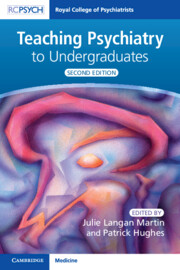Book contents
- Teaching Psychiatry to Undergraduates
- Teaching Psychiatry to Undergraduates
- Copyright page
- Contents
- Contributors
- Section 1 Principles of Medical Education
- Section 2 The Undergraduate Psychiatry Curriculum: Planning and Delivery
- Section 3 Clinical Placements in Psychiatry
- Section 4 Formal Teaching
- Section 5 Materials Development
- Section 6 Gathering feedback and quality improvement
- Section 7 Student Welfare
- Chapter 7.1 The Student in Difficulty
- Chapter 7.2 What Do I Do?
- Chapter 7.3 Raising Awareness and Promoting Well-Being
- Section 8 Developing as a medical educator
- Index
- References
Chapter 7.2 - What Do I Do?
from Section 7 - Student Welfare
Published online by Cambridge University Press: 12 October 2022
- Teaching Psychiatry to Undergraduates
- Teaching Psychiatry to Undergraduates
- Copyright page
- Contents
- Contributors
- Section 1 Principles of Medical Education
- Section 2 The Undergraduate Psychiatry Curriculum: Planning and Delivery
- Section 3 Clinical Placements in Psychiatry
- Section 4 Formal Teaching
- Section 5 Materials Development
- Section 6 Gathering feedback and quality improvement
- Section 7 Student Welfare
- Chapter 7.1 The Student in Difficulty
- Chapter 7.2 What Do I Do?
- Chapter 7.3 Raising Awareness and Promoting Well-Being
- Section 8 Developing as a medical educator
- Index
- References
Summary
Medical school can be enjoyable and rewarding, but often stressful for students. While adversity is a fact of life, patient safety is of central concern. This chapter explores how to support medical students through their difficulties and how we can help them learn from their experiences and grow as professionals.
- Type
- Chapter
- Information
- Teaching Psychiatry to Undergraduates , pp. 177 - 180Publisher: Cambridge University PressPrint publication year: 2022



